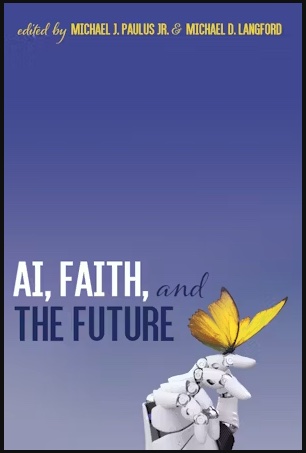It seems that Artificial Intelligence (AI) has taken the world by storm since the launch of ChatGPT early December 2022 and the authors of this volume, which was launched in June 2022, couldn’t have predicted the importance and relevancy of this topic in our society in 2023. The purpose of the book is that it will “facilitate further reflections and dialogue about AI to help us reimagine and pursue what is possible and necessary for a better world” by “engaging with resources from the Christian tradition to critique and participate constructively in the wise design, development, and use of AI” (12-13).
This volume consists of two parts: the first part Foundations contains four chapters that provides a robust primer for understanding and interpreting AI from a technological, philosophical, and theological perspective. The second part Explorations consists of five essays that each cover a specific, in-depth AI-related theme like e.g., the future of work and theological personhood. The authors’ distinctive interdisciplinary method distinguishes this book from most others on AI and theology. They offer a unique perspective by presenting AI as a phenomenon intertwined with theological and cultural aspects. This approach considers AI as a technology and social occurrence that increasingly influences and molds our society and explores its potential spiritual and religious ramifications. If you are new to the world of AI and theology, chapters 2 (An introduction to AI) and 4 (A theological framework for reflection on AI) are great resources to get familiar with these topics. Both chapters are well written, easy to read texts that will give you a framework for better understanding and assessing AI and its theological implications. In the current debate about AI a lot is being written about the expected impact AI will have on jobs and on education. Most publications are either utopian where AI will be able to change the world for better, or they are dystopic in which the focus is on the mass unemployment and havoc AI will create. Michael Paulus, the author of the 8th chapter on the impact of AI on work, provides a helpful third way to discuss the future of work by offering a pragmatic apocalyptic counternarrative. The function of apocalyptic literature, is “to present a narrative that opens up our imagination to a new view of the world” (183) and in the book of Revelation the key concept is about cities that have been transformed and amplified by God from an ambiguous human project to His dwelling place, where “complex human artifacts—including artificial autonomous agents—can be transformed into a constitutive part of God’s new creation” (184-185). In this apocalyptic view work is an ontological, meaningful part of the new creation and provides an interesting perspective on the telos of technology and work. The final chapter Sin and Grace Bruce Baker takes AI ethics into a broader discourse around the theological notion of sin. The ethical use of AI is a widely discussed topic and e.g., provides the foundation for the forthcoming EU AI Act. Baker rightly points out that these discussions easily end up in “a discussion of utilitarian value propositions and perhaps the need for transparency or privacy protections” (193), however, AI and AI ethics will not solve problems that are rooted in sin. The author focuses mainly on the consequences of unintentional and institutional sin and points out that developers and practitioners who work with AI have a special responsibility to pay attention for this. He ends this chapter by describing how AI can also act as a form of grace. In the epilogue of the book the reader can find a litany, which is a “thoughtfully organized prayer for use in public worship by the church, or as a personal devotional practice by individuals” (219), that will the reader reflect on AI, faith and what this means for the future.
I would highly recommend this volume to anyone who wants to learn more about AI and its societal and spiritual impact. It is very well written, very relevant and very helpful in understanding and interpreting the role AI plays in our culture and theology. I would encourage the editors to really consider publishing a second edition of the book in which they also add a chapter (or a few) on generative AI, which is about tools like ChatGTP, Google Bard and DALLE-2 that can create text, pictures, audio and video, and the impact this will have on faith and the future.
Michael J. Paulus Jr. & Michael D. Langford (eds.), AI, Faith, and the Future – An Interdisciplinary Approach, (Eugene OR, Pickwick Publications, 2022), 244 pp., USD 34.00, paperback (ISBN 978-1666703467).
